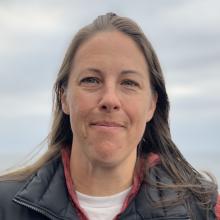
Sheryl Murdock
Tell us about your work/research. What kinds of things do you do?
My research looks at connections between the microbes and animals that inhabit deep-sea hydrothermal vents. Chemosynthetic microbes are the primary producers in these systems, using chemical energy rather than sunlight to fuel their growth and support hydrothermal vent food webs. My goal is to better understand who the important microbial players are and how they contribute to the success of animal communities by looking at the full complement of microbial genes from biofilms nestled in the base of dense animal assemblages.
What sparked your initial interest in your career?
I fell in love with hydrothermal vents when I first saw them in a National Geographic magazine as a child. They were the coolest thing I had ever seen on this planet. It wasn't until university that I found a similar love of microbiology and realized that those two passions fit well together. Microbes are the engines that fuel the deep sea, the largest habitat on Earth, and we still have loads to learn about their roles and functions.
Who influenced you or encouraged you the most?
My mom has always been my biggest cheerleader, and my husband really supported and encouraged me to go back to graduate school after working as a research technician for many years.
What element of your work/study do you think is the most fascinating?
Working with underwater robotic vehicles is definitely a highlight. Also, a trip to the seafloor in Alvin to look at a hydrothermal vent with my own eyes was pretty epic.
What other jobs led you to your current career?
After university I worked for 18 years as a lab technician studying hydrothermal vent microbes. Now I am a few months away from finishing my PhD.
What are your degrees and certifications?
Bachelor of Science in Biological Oceanography -- University of Washington
What are your hobbies?
My 10- and 13-year-old girls are my best hobby. We rock climb, camp, swim, bike, kayak, and I love to knit.
How did you get involved with the Ocean Exploration Trust?
My participation on this expedition is to recover and process samples from a remote fluid and microbial sampler deployed last year by Ocean Networks Canada.
What advice would you give someone who wants to have a career like yours?
Get lab experience early and often while in university. Seek out professors who do research you find interesting and offer to volunteer. Learn techniques, talk to graduate students about what they do, find what interests you and pursue it.
Expeditions
Sheryl participated in the following Ocean Exploration Trust expeditions:
